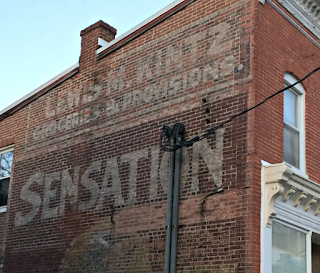Yule-Tree Vendors Played Rubes in Big City
Henry Beitzel of Accident in Garrett County was, by all accounts, a savvy entrepreneur with multiple income streams (farming, mining, maple-sugar making), a hardworking craftsman who laid brick for the new English Lutheran Church building, an avid newspaper reader who sent six children to school. He was, in short, no dummy.
Yet, when he and two friends traveled by train to Pittsburgh to sell a crop of home-grown Christmas trees in December 1892, they amused themselves -- and, doubtless, attracted business -- by playing wide-eyed, ignorant hillbillies, predecessors of the later stereotyped characters in Li'l Abner, No Time for Sergeants and The Beverly Hillbillies.
Their rube act made good copy for the big afternoon daily, The Pittsburg Press, which for years had Pennsylvania's second-largest circulation, behind only the Inquirer of Philadelphia (and which would not add the "h" to its name until 30 years later). The Press headline told the story:
Visitors From Maryland / They Came From the Mountain Regions To Sell Trees. / Novel Sights in and About the City Keep Them on the Jump—Electric and Cable Cars Astonish Them. Elevators a Novelty
John McGonnell, proprietor of the Tremont house, in Diamond Square, is entertaining three of the most unique individuals that ever chanced to land in Pittsburg. ...
All of the men are from the neighborhood of a small mountain village called Accident, situated in Garrett county, Md., and right in the heart of the Allegheny mountains. Their names appear on the hotel register as follows:
Joel Bender, Accident, Md.;
Joseph Hostedler, a little out of Accident;
Henry Beitzel, a little tother side of Accident.
The men arrived in Pittsburg on Wednesday with three [railroad] car loads of Christmas trees which they propose to sell before the holidays. ...
Bender has been in the city before, but not so with Hostedler and Beitzel. This is their first appearance, and their experience would more than fill a book.
Beitzel claims he never saw a brick house before, and he says he is wondering how the “danged things” keep together.
He is also wondering how the [street]cars go scooting through the streets without anything pulling or pushing them.
Beitzel seriously objects to riding on elevators, though he says that with a little practice on an empty stomach, he might get used to it. He boarded the elevator in the Tremont house yesterday afternoon for the first time to go to his room on the top floor.
“When the red haired boy pulled the rope and the walls started to slide down, I felt a little fullness in my throat,” said Beitzel to a Press reporter.
The boy waited for Beitzel to go down again, but Beitzel declined, saying his dinner had not yet settled and he thought a little walking would do him good. Now he is using the stairway and will continue to use it during his sojourn here.
Hostedler takes no stock in street cars, elevators, or any other new fangled machines, as he calls them. He never saw a steam engine or a train of cars until last Monday, although he is 60 years old.
The men say that when at home they got hold of a newspaper about once a year, and that President Cleveland’s election is unknown to some of the mountain dwellers. All the information they get is from hunters who chance to pass that way.
Children walk eight or ten miles to school each day except during the winter months, when the mountain roads are snowed up. ...
Bender and Hostedler thought they would go to some theater last night, but Beitzel declined an invitation. He says the pictures on the bill boards are enough for him. He says the pictures look too much like some of the things done by the Hatfields-McCoy gang in the mountains of West Virginia.
The men will stay in Pittsburg until they have sold off their large stock of trees.
Given this great free advertising, I imagine the city folks pouring into the Tremont to get a load of these wild mountaineers, only to tote out a Christmas tree a half-hour later, perhaps having overpaid but not even minding, so much fun had they had, talking about modern wonders such as plumbing and pavement.
Throughout the article, complex layers of role-playing is going on. The visitors are role-playing as hicks, because they know that will attract curious customers, and perhaps put the city folks off their guard, loosen up their wallets.
To pull this off, they know they need a big write-up in the press; did they call the Press, one wonders, or did the hotel manager do it for them, likewise hoping for a customer influx at the bar, the cafe, the barbershop? To what extent was the manager in on the joke?
The reporter who showed up certainly was in on the joke, but was glad to play along, because these guys were genuinely funny, a pleasure to hang out with, and the story wrote itself, and what else was happening anyway, in the run-up to the holiday?
At one point, early in the story, the reporter makes a telling observation about the three visitors: "In appearance they may look green, but they are business from ground floor up, and keep both eyes wide open all the time."
We can assume they sold all their trees (probably before the next day's Press was printed), because for many decades thereafter, one of Henry Beitzel's descendants still had the cherished, much-folded newspaper clipping -- surely a record of a family triumph in business, comic performance, and sheer duplicity. I'm glad Alverda Beitzel Beachy kept this document, and glad that Beitzel family historian Florence Harris Abel included it in her book.
Abel notes, by the way, that in December 1892, the schoolhouse was only three miles away. So there.
Source:
Abel, Florence Harris. The Beitzel Family. Baltimore:
Gateway P, 1986. Pages 56-58.

Comments
Post a Comment